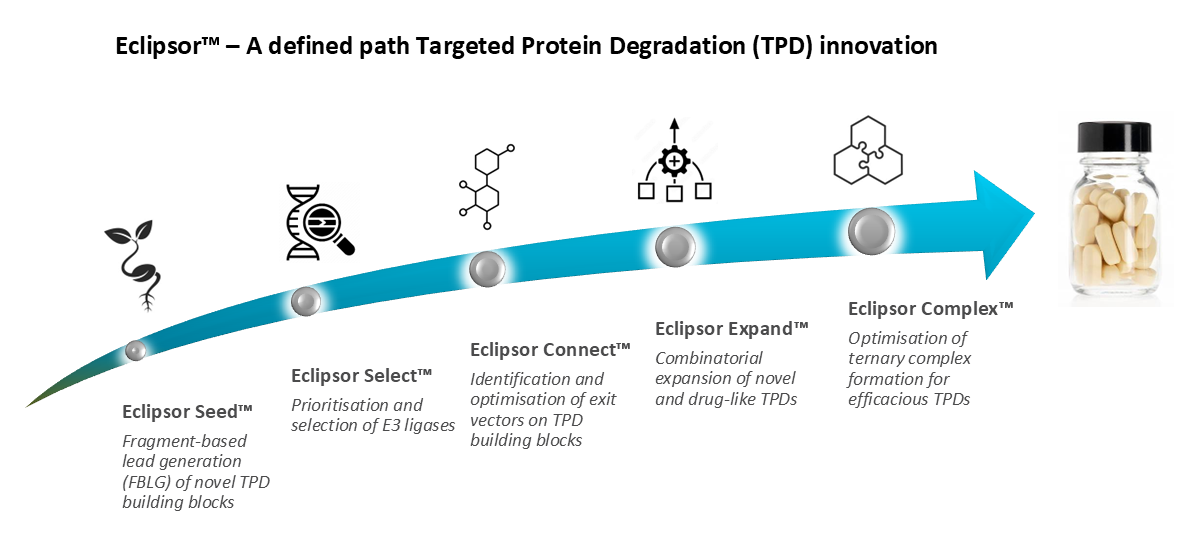With Eclipsor™, our proprietary platform for efficient generation of proteolysis-targeting protein degraders (TPDs), we are leveraging this emerging modality to create innovative treatments for diseases with high unmet medical needs
What is targeted protein degradation?
Targeted protein degradation uses the body’s natural protein disposal system to specifically destroy disease-causing proteins. By selectively marking disease protein with specific tags, they can be directed for processing by the proteasome, a highly sophisticated protease complex evolved by nature to carry out the selective and efficient hydrolysis of proteins.
The tagging of the disease protein is achieved by bi-functional molecules designed to selectively bring the disease protein into proximity of enzymes (E3 ligases) that add the destruction tag (ubiquitin).
Advantages of applying targeted protein degradation
Catalytic effect – A targeted degrader catalyses the destruction of its target and can do this for multiple copies of the target (i.e., event-driven pharmacology). This provides superior potency over a traditional inhibitor which only block its target when it is bound to it (occupancy-driven pharmacology). The catalytic efficiency means that targeted degraders are efficacious at lower doses.
Longer duration – By eliminating its target protein, a targeted degrader forces the cell to resynthesise the target protein before its function is restored. This leads to a more durable efficacy compared to a traditional inhibitor that have a more transient activity.
Elimination of multiple functions – Many disease proteins have multiple functions. A targeted degrader that catalyses the destruction of a protein effectively eliminates all its functions. This provides a more significant impact than achieved with a traditional inhibitor which typically only disrupts one function of its target protein, leaving its other functions intact.
Higher specificity – A targeted degrader needs to form a productive ternary complex with both the target protein and the E3 ligase to be efficacious. This requires a targeted degrader to be more precise in its molecular interactions compared to a traditional inhibitor which only interacts with one protein. The simpler a molecule is, the more likely it is to be engaged in off-target interactions that lead to adverse side effects.
Addressing previously druggable proteins – A key advantage of targeted degraders is that they can be developed regardless of whether the protein has enzymatic activity, making them applicable to a broader range of targets, for example structural proteins.
Translation of targeted protein degradation to therapy
Targeted protein degradation offers a revolutionary approach to therapy by selectively eliminating disease-causing proteins. This technique enables the development of highly specific treatments, potentially overcoming resistance to traditional drugs and addressing diseases with previously unmet medical needs, thus paving the way for more effective and personalized care.
The Eclipsor™ platform
With Eclipsor™, our proprietary platform for efficient generation of proteolysis-targeting protein degraders (TPDs/PROTACs), we are utilizing this emerging modality to create innovative treatments for diseases with high unmet medical needs.

Further reading
- Tsai et al. (2024) Targeted protein degradation: from mechanisms to clinic. Nat Rev Mol Cell Biol, https://doi.org/10.1038/s41580-024-00729-9.
- O'Brien Laramy et al. (2023) Delivering on the promise of protein degraders. Nat Rev Drug Discov, 22(5):410–427. https://doi.org/10.1038/s41573-023-00652-2.
- Békés et al. (2022) PROTAC targeted protein degraders: the past is prologue. Nat Rev Drug Discov, 21(3):181–200. https://doi.org/10.1038/s41573-021-00371-6.
Stay Updated
Sign up for the Beactica newsletter to receive our latest news and updates
